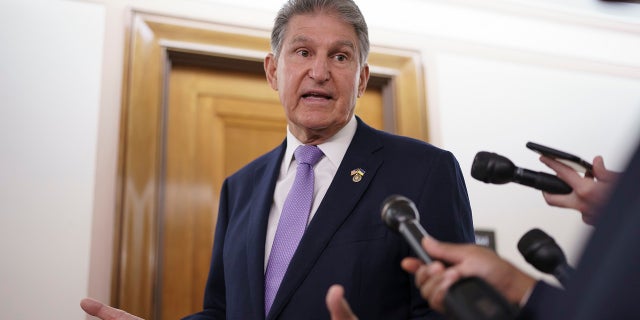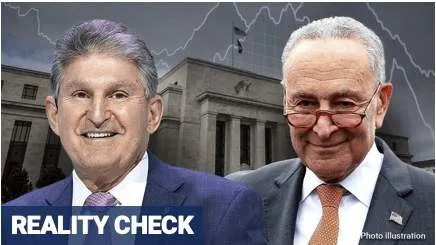(Fox News) A deal reached last week by Senate Majority Leader Chuck Schumer, D-N.Y., and Sen. Joe Manchin, D-W.Va., after months of party in-fighting is being billed as the “Inflation Reduction Act,” but studies suggest it will have little impact on reducing inflation while bringing tax hikes to middle- and working-class Americans.
The Inflation Reduction Act, a slimmed down version of President Biden’s Build Back Better (BBB) Act, will cost an estimated $433 billion, most of which will be invested in climate provisions, while increasing tax revenue by $739 billion. The bill will require large corporations to pay at least 15% in taxes, which is projected to raise tax revenue by $313 billion, as well as boost IRS enforcement, estimated to raise tax revenue by another $124 billion, and it will close the carried interest loophole, estimated to raise $14 billion.
Manchin’s agreement to the legislation ended a months-long stalemate on Biden’s multi-trillion dollar BBB Act, which Manchin repeatedly blasted as exorbitant and inflationary.
“If I can’t go back home and explain it, I can’t vote for it,” Manchin said in December.

Sen. Joe Manchin, D-W.Va., is met by reporters outside the hearing room where he chairs the Senate Committee on Energy and Natural Resources, at the Capitol in Washington, July 21, 2022. (The Associated Press)
On Sunday, Manchin insisted the new bill will reduce inflation while “not putting a burden on any taxpayers whatsoever.”
While the bill does not raise the federal tax rate, Republicans are sounding the alarm after the nonpartisan Congressional Joint Committee on Taxation (JCT) released data over the weekend estimating the corporate tax will be passed down, raising taxes on Americans across every income bracket.
In 2023, the year in which the legislation would increase tax revenue most, individuals making less than $10,000 per year would pay 3.1% more in taxes and those making between $20,000-30,000 per year would see a 1.1% tax increase, the JCT analysis showed. Tax revenue collected from those making $100,000 per year or less would increase by $5.8 billion in 2023, the report said.
By 2031, when the new energy credits and subsidies are set to provide an even greater benefit to wealthier Americans, those earning below $400,000 are projected to pay as much as two-thirds of the additional tax revenue collected that year, Republicans on the Senate Finance Committee said in a press release Saturday, citing the JCT report.

President Biden speaks about inflation and supply chain issues in Los Angeles. (AP Photo/Damian Dovarganes)
“The mislabeled ‘Inflation Reduction Act’ will do nothing to bring the economy out of stagnation and recession, but it will raise billions of dollars in taxes on Americans making less than $400,000,” Senate Finance Committee Ranking Member Mike Crapo, R-Idaho, who requested the analysis, said in the release.
“The more this bill is analyzed by impartial experts, the more we can see Democrats are trying to sell the American people a bill of goods,” Crapo continued. “Non-partisan analysts are confirming this bill raises taxes on the middle class and produces no meaningful deficit reduction when gimmicks are removed and the full cost is accounted for. It’s no wonder this bill, which was drafted behind closed doors, is being rushed through the Senate at record pace.”
Sen. Bill Cassidy, R-La., who also sits on the Senate Finance Committee, slammed the bill in a statement to Fox News Digital.
“The only way the Inflation Reduction Act will decrease inflation is by raising taxes on middle-income and lower-income families so that they don’t have money to spend,” he said. “In health care, we call that killing the patient to heal the disease. It is not how to treat American taxpayers.”
Ashley Schapitl, a spokesperson for Senate Finance Committee Chair Ron Wyden, D-Ore., disputed the JCT report, telling FOX Business that families making less than $400,000 “will not pay one penny in additional taxes under the Inflation Reduction Act.”
“This is the same trickle down economic argument Republicans have been making for decades, and the American people don’t buy it,” Schapitl said.
“The analysis Republicans are pointing to is also incomplete,” she continued. “It doesn’t include the benefits to middle-class families of making health insurance premiums and prescription drugs more affordable. The same goes for clean energy incentives for families.”
The JCT did not factor in health care or prescription drug impacts on taxes under the bill, but listed about 20 clean energy provisions it did factor into the analysis.
Biden has repeatedly pledged that Americans earning less than $400,000 per year would not experience any tax increase during his presidency. He made the same pledge Thursday during a speech about the legislation, declaring, “This bill will not raise taxes on anyone making less than $400,000 a year.”

Democratic Senators Joe Manchin and Kyrsten Sinema. (Getty Images/Reuters)
According to a December analysis by the Tax Foundation, the most economically damaging provision in the bill that survived the arduous negotiation process is the 15% “corporate alternative minimum tax,” which requires businesses with profits over $1 billion to pay a minimum tax rate of 15%.
The minimum tax alone will reduce GDP by 0.1 percent and cost about 27,000 jobs, the Tax Foundation projects. The minimum tax will deal the biggest blow to coal workers, levying a net tax hike of 7.2% on the coal industry’s pretax book income, according to a November analysis by the foundation. The second-hardest hit by the tax, according to the study, is the automobile and truck manufacturing industries, which face a 5.1 percent tax hike, the study said.
Manchin defended the minimum tax on CNN Sunday, saying, “People should be paying their fair share, especially the largest corporations in America that have a billion dollars of value or greater. Can’t they pay at least 15%, so that we can move forward and be the leader of the world and the superpower that we are?”
And while Democrats are pitching the bill as an inflation-fighting measure, a new analysis from the Penn Wharton Budget Model, a nonpartisan group at the University of Pennsylvania’s Wharton School, shows it will have an impact on inflation that is “statistically indistinguishable from zero.”
“The Act would very slightly increase inflation until 2024 and decrease inflation thereafter,” the analysis said. “These point estimates are statistically indistinguishable from zero, thereby indicating low confidence that the legislation will have any impact on inflation.”






